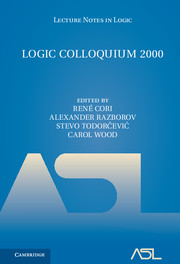Book contents
- Frontmatter
- Introduction
- Contents
- K. Jon Barwise (1942-2000)
- TUTORIALS
- PHOTOGRAPHS
- ARTICLES
- Bounded forcing axioms and the size of the continuum
- Hilbert's wide program
- Rigidity conjectures
- Metapredicative and explicit Mahlo: a proof-theoretic perspective
- A two-dimensional tree ideal
- Psychology looks hopefully to logic
- Russell's logics
- Partitioning pairs of uncountable sets
- Aspects of the Turing jump
- Liouville functions
- References
Russell's logics
from ARTICLES
Published online by Cambridge University Press: 27 June 2017
- Frontmatter
- Introduction
- Contents
- K. Jon Barwise (1942-2000)
- TUTORIALS
- PHOTOGRAPHS
- ARTICLES
- Bounded forcing axioms and the size of the continuum
- Hilbert's wide program
- Rigidity conjectures
- Metapredicative and explicit Mahlo: a proof-theoretic perspective
- A two-dimensional tree ideal
- Psychology looks hopefully to logic
- Russell's logics
- Partitioning pairs of uncountable sets
- Aspects of the Turing jump
- Liouville functions
- References
Summary
Abstract. In 1903, inAppendixBof The Principles ofMathematics, Russell described a paradox he had discovered late in 1902. This paradox is more difficult than the better known paradox of 1901, which depends upon the notion of set. The later paradox concerns what we should call today the “hyperintensional” notion of proposition, understood as the meaning of a possible sentence, and it reveals that this notion is subject to difficulties analogous to those that the earlier paradox uncovered in the concept of set. Russell seems to have forgotten or ignored the 1903 paradox, for he never mentioned it again, at least in works published in his lifetime. John Myhill rediscovered it, in a slightly different form, in 1958; consequently it attracted the attention of logicians, notably Church, in the seventies.
The hyperintensional paradox, and others of the same sort, have been unjustly neglected. When they and their implications are taken into account, the development of Russell's thought, and the history of logic in general, from The Principles to Principia Mathematica, appear in a new light. If we look with care at the succession of logics that Russell conceived, it becomes evident that logical paradoxes of this little known kind played an important role. Indeed, Russell himself underestimated their significance and gave undue weight to the epistemological paradoxes. This has led many to overemphasize the importance of the semantical paradoxes.
There are at least three ways of telling the story of Russellian logic, which may be qualified as popular, scholarly, and rational. I'll consider them in turn. It is in terms of the last one that I have tried, over the course of last years, to contribute to the renewal of Russellian studies in logic. The results of my efforts have essentially been consigned to a book [17], whose ideas are echoed here and to which I refer the interested reader for fuller details and references.
The popular story. Here is the popular story, recounted as simply as possible.
Like Frege, Russell thought that he could solve the problem of the foundations of mathematics (from elementary arithmetic to classical mathematical analysis) by showing that they were reducible to logic (this was the fundamental thesis of “logicism”). Logic was then understood in a broad sense, covering notably the Cantorian theory of sets.
- Type
- Chapter
- Information
- Logic Colloquium 2000 , pp. 335 - 349Publisher: Cambridge University PressPrint publication year: 2005

